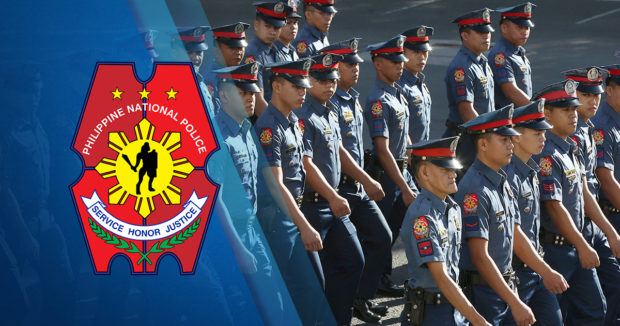
Police officers march at the Philippine National Police grounds in Camp Crame in Quezon City. (File photo by NIÑO JESUS ORBETA / Philippine Dailly Inquirer)
MANILA, Philippines — Reeling from the biggest drug scandal to rock the Philippine National Police, the National Police Commission (Napolcom) is planning to steer the government’s anti-drug campaign away from its metrics-driven approach so that law enforcers won’t be tempted to fabricate arrests and confiscations, a top official told senators on Tuesday.
Lawyer Alberto Bernardo, Napolcom vice chair and executive officer, said the anti-drug agencies were planning a shift in strategy to veer away from a statistics-heavy analysis of the country’s drug situation, in the wake of the controversy over the P6.7-billion drug haul in Manila last year and its alleged cover-up.
“We need to change this statistical basis in our crime situation wherein performance rating is based on the volume of seizures, which has prompted some officers to concoct their arrests just so they can have accomplishments,” he said.
Arrests for promotion
Bernardo said the current system requiring police officers to produce five to 10 arrests to be considered for promotion was inherently flawed.
“For instance, if a province or a city has low drug-related crime statistics, this should not be taken to mean the drug situation there is good; on the other hand, no arrests should not be taken to mean that the locality is already drug-free,” he said.
Bernardo made the disclosure as the Senate public order and dangerous drugs panel resumed its hearing on the seizure of more than a ton of “shabu,” or crystal meth, valued at P6.7 billion, from an anti-drug operative, Police M/Sgt. Rodolfo Mayo, in Manila in October last year.
The committee chaired by Sen. Ronald dela Rosa is also looking into the alleged coverup involving the drug bust involving Mayo and the discovery of another 40 kilos abandoned near the PNP headquarters at Camp Crame in Quezon City.
The abandoned drug stash inside a parked car was purportedly left there for narcotic operatives as part of a prevailing “reward system.”
According to Bernardo, transnational drug syndicates are using their vast resources to “exploit cracks in the system” to put the PNP “under attack.”
“These syndicates have way more funding than PDEG (PNP Drug Enforcement Group) or Napolcom; with this [shabu haul], they could have easily paid off anyone and exploited their human frailty,” he said.
Since July 2022, the PNP has confiscated some P15 billion worth of illegal drugs and arrested about 25,000 individuals.
Fund for operatives
Bernardo said Napolcom and the PNP were working together for reforms in the drug campaign, including enough funding for narcotic operatives. He noted that because of insufficient budget, operatives had started asking for cash rewards in exchange for drug seizures.
Bernardo detailed Napolcom’s initial findings into the events surrounding the seizure of 990 kilos of shabu, based on security camera footage from the site of Mayo’s purported arrest last year.
The footage belied earlier claims by police officers implicated in the alleged cover-up attempt, including two police generals, two police colonels, and several lower-ranked PDEG personnel, on why they released Mayo.
The video showed Mayo together with the arresting officers three hours before the supposed arrest.
Police officers were also shown unloading bags of what Bernardo said were illegal drugs and transporting them to a nearby warehouse, even after the arrival of key PDEG officers led by Police Brig. Gen. Narciso Domingo.
The implicated operatives, however, refused to talk during Tuesday’s Senate hearing, repeatedly invoking their right against self-incrimination.
Senators were visibly irked by their silence.
“Look at what has happened to all of you! All you think about is the money,” Dela Rosa told them. At one point, Dela Rosa dropped to his knees and begged the witnesses to help “flesh out the truth.”
Until his fall from grace, Mayo was a decorated officer with no derogatory record.
In May 2022, he was one of 19 PDEG officers recognized for their “meritorious heroic acts as an offshoot of a drug buy-bust operation on May 22, 2022, in Valenzuela City.” He was later named “best senior police noncommissioned officer” of PDEG.

